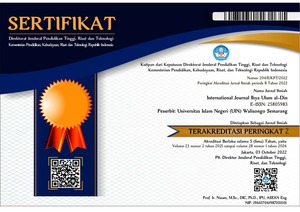Pemikiran Al-Khawarizmi dalam Meletakkan Dasar Pengembangan Ilmu Astronomi Islam
DOI:
https://doi.org/10.21580/ihya.20.1.2782Keywords:
al-Khwārizmī, Dixit Algorizmi, Mathematical AstronomyAbstract
The progress of Islamic civilization is inseparable from the influence of the emergence and rapid development of Islamic astronomy. Islam leads the world civilization and breaks the record as the longest-running civilization lasting more than 14 centuries. At this time, astronomical activities in the Islamic world began to develop intensively. This condition cannot be separated from the role of al-Khwarizmi who made a very valuable contribution. The construction of his thinking which was based on mathematical astronomy made him the foundation of the development of Islamic astronomy, in addition to its development of the geocentric theory of Aristotle and Ptolemy. This is the real contribution of al-Khwarizmi that is very large and fundamental in the heyday of medieval Islam which eventually became the starting point of the scientific development and subsequent Muslim astronomers to date. The emergence of various observatories and planetariums which made observations with more modern tools finally gave birth to many new theories in the study of world astronomy. This study explores al-Khwarizmi's role in the growth and development of astronomy in his time to the present.
Downloads
References
Ramdan, 2009, Islam Astronomi, Jakarta: Bee Media Indonesia
Hendro Setyanto, 2008, Membaca langit,, Jakarta; Al-Ghurab,
Toby E. Huff, 1995, The Rise of Early Modern Science: Islam, Cina, and The West, New York: Cambridge University Press,
Bartel. L. van der Waerden, 1985, A History of Algebra:From al-Khwarizmi to Emmy Noether, Zurich: Springer-Verlag Berlin Heidelberg Gmbh
Luis Puig, 2008, Historias_de_al-Khwarizmi_1a_entrega, Universitat de València, [email protected] SUMA 58 Junio
Ibrahim M., Arab Civilization: Challenges and Responses : Studies in Honor of Constantine K. Zurich: SUNY Press,. ISBN 0-88706-698-4.
Barnabas Huges, 1986, Gerard of Ceremona’s Translation of Al-Khwarizmi’s al-Jabr: A Critical Edition, Northridge: California University
Frederic Rosen.,"The Compendious Book on Calculation by Completion and Balancing, al-Khwārizmī". English Translation. Retrieved 2009-09-14,
Karpinski, L. C., 1912,"History of Mathematics in the Recent Edition of the Encyclopædia Britannica". American Association for the Advancement of Science,
Boyer, Carl B., 1991, "The Arabic Hegemony". A History of Mathematics (Second ed.). John Wiley & Sons, Inc., 228. ISBN 0-471-54397-7.
John J O' Connor,.; Robertson, Edmund F., "Muhammad ibn Musa al-Khwarizmi", MacTutor History of Mathematics archive, University of St Andrews
Rashed, R. 1990, Armstrong, Angela. “The Development of Arabic Mathematics”. Springer, 1994,. ISBN 0-7923-2565-6
A. Jeffrey Toomer Oaks,. "Was al-Khwarizmi an applied algebraist?". University of Indianapolis. Retrieved 2008-05-30., ISSN 0033-4766.
Edward S. Kennedy, Mathematical Geography, ttp;tnp,tt.
Gerald Toomer. 1990, "Al-Khwārizmī, Abu Ja‘far Muḥammad ibn Mūsā". In Gillispie, Charles Coulston. Dictionary of Scientific Biography. New York: Charles Scribner's Sons
Thomas, 1991, Geer Astronomy, London; GPC
Purwanto, 2009, Pengantar Kosmologi, Surabaya; ITS Press
Berry, 1898, A Short History Of Astronomy: From Earlist Times Through The Nineteenth Century, New York: Dover Publicaations
Pedersen, 1993, Early Physics and Astronomy : A Historical Introduction, Cambridge: CUP
Kartanegara, 2006, Reaktualisasi Tradisi Ilmiah Islam, Jakarta: Penerbit Baitul Ihsan
Downloads
Published
How to Cite
Issue
Section
License
By submitting an article to the journal, the author(s) agree to transfer the published article's copyright to the journal, which will act as the publisher. This means the journal will have the right to publish the article in various forms, including reprints. The journal will maintain the publishing rights to the published articles.
This work is licensed under Creative Commons Attribution-ShareAlike 4.0 International License.
In line with the license, authors and third parties (readers, researchers, and others) are allowed to share and adapt the material. In addition, the material must be given appropriate credit, provided with a link to the license, and indicated if changes were made. If authors remix, transform or build upon the material, authors must distribute their contributions under the same license as the original.



